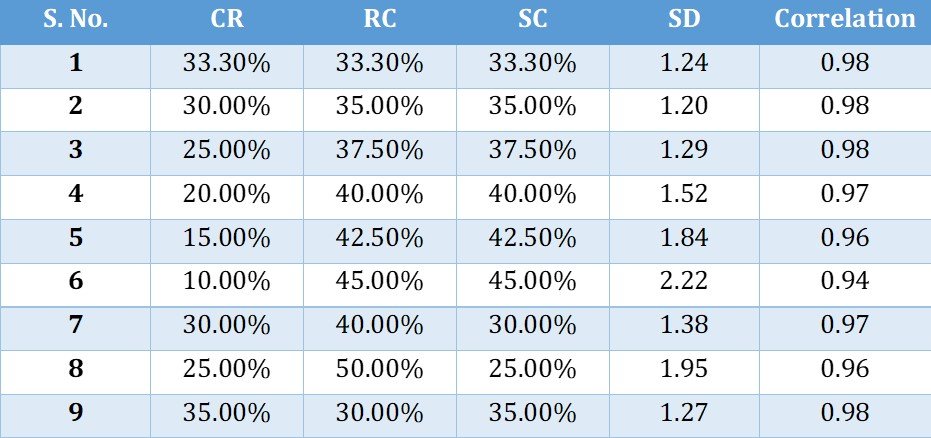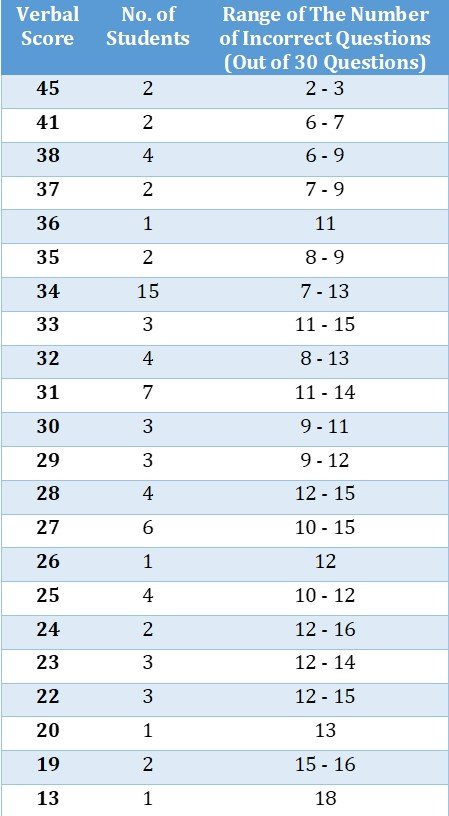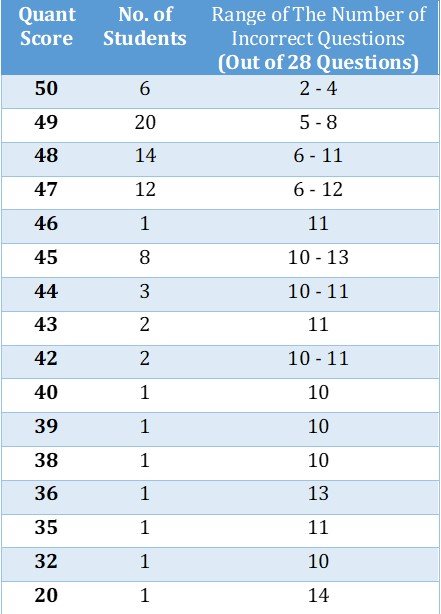I am thoroughly excited to present this article. This article is a result of my analysis of 75 ESRs I’ve gotten from students, mine or otherwise. From the analysis, I’ve tried to answer some of the most frequently asked questions by GMAT aspirants such as:
1. Do Verbal and Quant Scores have equal weights in the Total Score?
2. In Verbal, is there any one sub-section (CR, SC, or RC) significantly more important than the other two?
3. How many questions can I get wrong to reach a certain Verbal or Quant score?
4. What is the maximum Verbal or Quant score can I reach if I get a certain number of questions wrong?
5. Why is it so much easier to score a Q45 than a V45? Why has GMAC made it much more difficult to score high on Verbal than on Quant?
6. Are the first few questions more important than the remaining ones?
7. Does the GMAT algorithm follow a fixed pattern i.e. giving similar difficulty level of questions for similar performance?
Are you excited to know, probably for the first time, data-driven answers to the above questions?
I definitely am.
Let’s get started.
Do Verbal and Quant Scores have equal weights in the Total Score?The short answer is YES.
And at the end of this answer, I’m going to give you a formula with which you can calculate the total score of anybody by just knowing their quant and verbal scores, without looking up any calculator or chart online!
The reasoning behind the answer (i.e. YES) is two-fold (the two folds are inter-related to an extent):
1. The correlation between Total Score and the Sum of Verbal and Quant scores is almost 1 (0.994 to be precise). This means that Total Score is a linear function of the Sum of the two scores. Besides, when I try to assign ‘different’ weights to the Verbal and the Quant scores, the correlation between the Total Score and Weighted Sum turns out to be lower, indicating that the actual weight is equal to 1.
2. I can very accurately predict the total scores of all the 75 items in my list by simply multiplying a constant with the Sum of the two scores (Verbal and Quant).
Correlation is a Statistics term that varies between -1 and 1. Higher the magnitude of correlation, stronger the relationship between variables. A correlation of +1 or -1 indicates perfect relationship, meaning that one can ‘accurately’ estimate the value of one variable using the value of the other variable. A positive correlation means that both variables change in the same direction i.e. both increase at the same time or decrease at the same. A negative correlation means that the variables change in opposite directions i.e. if one increases, the other decreases. A zero correlation means that the two variables are completely independent. An example of zero correlation could be the correlation between the number of hairs on a person’s body and his GMAT score.Both the above observations indicate that
a point in Verbal is equivalent to a point in Quant in terms of its impact on the total score.
One quite expected observation from the data is a very low correlation between Quant and Verbal scores (0.12 to be precise). Such a correlation indicates that the two sections are testing very different skills. While this is quite obvious, I found it interesting to verify this from the data.
Now, comes the formula for calculating the total score of a person from his/her Quant and Verbal scores.
Let’s denote the Quant score with Q and the Verbal score with V.
Total Score = 8.25*(Q+V) i.e. you add up the Quant and Verbal scores of the person and multiply the sum with 8.25 to get his Total Score.
Now, the obvious question is: how accurate is the formula?
The answer is
very accurate. Using this formula, I could calculate the Total Score exactly i.e. without error in 50% of the cases, within ±10 points in 90% of the cases, and within ±20 points in 100% of the cases i.e. my calculation ‘never’ overshot or undershot the actual score by more than 20 points. If you have been paying attention to the GMAT scores and Verbal-Quant splits of others, you’d already know that this much variation i.e. ±20 points is seen in Total scores with same Quant and Verbal splits. In this way, the above formula seems as precise as a derived formula can get.
You can try out this formula on your past GMAT scores or on the scores of your known ones. However, I understand that the formula doesn’t look very easy to calculate without a calculator. One way to skip the calculator is to recognize that 8.25 is equal to 33/4. So, you can arrive at the total score by dividing the sum of Quant and Verbal scores by 4 and then multiplying the result with 33.
If this way still appears difficult and you are ok with slight imprecision, you can arrive at the total score by dividing the sum of Quant and Verbal scores by 12 and then multiplying the result with 100. I hope this should not be very difficult. This result is slightly imprecise since we are multiplying 8.33 instead of 8.25. However, this formula gives you a good estimate without involving difficult calculations.
Total Score = ((Q + V)/12)*100We can call this way of calculating the total score - CJ’s formula ? I don’t mind taking credits!
(This formula gives accurate results for a large range of Total Scores (400-770). For scores lying on the extremes (either <400 or >770), the formula may not yield as accurate results.)
In Verbal, is there any one sub-section (CR, SC, or RC) significantly more important than the other two?The short answer is No.
However, let me put a disclaimer: the data doesn’t provide as clear an answer to this question as it did to the previous question.
Now, let me tell you how I went about to answer this question.
First of all, I tried to figure whether each of the three sub-sections is equally important. If the average of the three sub-sectional scores is always (or almost always) equal to the Verbal score, it will very strongly indicate that all three sections are equally important since the Verbal score is just an average of the three scores.
From the data, I see that the average of the three scores (individual CR, RC, and SC scores) is a very good estimate of the total score, with correlation equal to 0.98 and SD equal to 1.24. SD (square root of the average squared difference) of 1.24 means that on an average, you can expect a difference of 1.24 between the actual Verbal score and the average of the three sectional scores. I found this number neither too low to ignore the average of three sub-sectional scores as a good estimate for the Verbal score nor too high to consider the average to be an ‘excellent’ estimate for the Verbal score.
Thus, the data didn’t provide a convincing answer to this question. However, then, I tried assigning different weights to the three sections to see whether these two parameters (correlation and SD) – become favorable for a particular set of weights - favorable means high correlation and low SD. I found the following data.
Attachment:
 ESR 1.jpg [ 104.36 KiB | Viewed 6038 times ]
ESR 1.jpg [ 104.36 KiB | Viewed 6038 times ]
What I could observe was that for smaller changes in the comparative weights of the three sections (i.e. in cases 1,2,3, and 9), the SD and Correlation numbers were so close that I could not choose one set of weights over the others. The differences could be entirely due to randomness in the data.
However, I could also see that as I started bringing in bigger changes in the comparative weights of the three sections (i.e. 4, 5, 6, and 8), both SD and Correlation numbers started turning rapidly in the adverse direction, indicating that there are no significant differences in the weights or importance of these three sub-sections.
From my data, while I cannot rule out slight differences in the weights of the three sub-sections, I don’t think there are significant differences in the weights.
On a side note, I also found the correlations among the sub-sectional scores i.e. CR, RC, and SC.
Correlation between CR and RC: 0.326
Correlation between CR and SC: 0.146
Correlation between SC and RC: 0.316
A greater correlation means that the two scores have a greater propensity to move in tandem. An interesting observation is a very low correlation between CR and SC scores, indicating that the two scores are almost independent i.e. we cannot judge a person’s CR ability from his SC ability or vice-versa.
How many questions can I get wrong to reach a certain Verbal or Quant score?Here’s the table for Verbal:
Attachment:
 ESR 2.jpg [ 71.96 KiB | Viewed 6059 times ]
ESR 2.jpg [ 71.96 KiB | Viewed 6059 times ]
The first column lists the Verbal score, the second column the number of students with that Verbal score, and the third column the range of the number of incorrect questions for that Verbal score. (Please note that ESRs contain data for only the
scored questions (30 in Verbal and 28 in Quant) and not the experimental questions. Thus, the numbers of incorrect questions in the above table are out of 30.)
For example:
In my data of 75 ESRs, 15 ESRs had a Verbal Score of 34. The maximum number of questions a person with a V34 got incorrect was 13, and the corresponding minimum number was 7. Thus, if you are targeting a V34, you can get 7-13 questions wrong.
We can see that there is a good amount of overlap in the ranges for different scores. Getting 13 questions wrong can land you at V34 or even at V20!! (The guy with V20 in my data also got 13 questions wrong, as can be seen from the table above)
Given such a good amount of overlap of the number of incorrect questions across different scores, we can see something most of us already know that it’s not just about the number of questions you get right or wrong; it’s also about the difficulty level of the questions you get right or wrong.
Here’s the table for Quant.
Attachment:
 ESR 3.jpg [ 53.68 KiB | Viewed 6071 times ]
ESR 3.jpg [ 53.68 KiB | Viewed 6071 times ]
The interesting observation from the above data is that there is no overlap between Q50 and Q49 in terms of the number of incorrect questions. This means that if you get 4 questions wrong, you’ll get a Q50 and if you get one more question wrong, you land up at Q49. (Even though these ranges may change once we get data from more ESRs, I find this data reliable to a large extent since there are 6 data points for Q50 and 20 data points for Q49.)
This post was originally posted on this link:
https://gmatwithcj.com/articles/data-dri ... at-part-1/You can find the second part of this article on this link:
https://gmatwithcj.com/articles/data-dri ... at-part-2/You can find the third part of this article on this link:
https://gmatwithcj.com/articles/data-dri ... at-part-3/ 



























